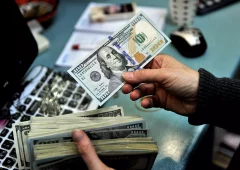Justin Sun Comments on Alleged Fraud Involving TUSD Reserves
06.04.2025 8:00 2 min. read Kosta Gushterov
Justin Sun, the founder of Tron (TRX), has accused First Digital Trust (FDT) of orchestrating a major financial scandal involving the misuse of reserves backing the TUSD stablecoin.
According to Sun, the misconduct rivals, and even surpasses, the collapse of FTX, making it one of the most severe cases in the crypto sector.
Sun claims that FDT withdrew approximately $456 million from TUSD’s reserves without informing users, subsequently issuing the amount as an unsecured loan to a dubious entity based in Dubai. He suspects that the transaction may be linked to money laundering and embezzlement, presenting it as a criminal scheme.
While reflecting on the FTX debacle, Sun pointed out a stark difference between the two cases. He argued that despite Sam Bankman-Fried’s misuse of customer funds, the FTX founder at least utilized tokens such as FTT and SRM as loan collateral and invested in established companies like Robinhood and Anthropic. In contrast, Sun alleges that FDT transferred funds into suspicious assets without providing any collateral or maintaining transparency.
Sun further criticized FDT’s response to the crisis, contrasting it with the approach taken by Bankman-Fried, who cooperated with authorities to help recover customer assets. In Sun’s view, FDT’s leaders have remained silent and indifferent, worsening the situation.
He also expressed concern about the potential impact on Hong Kong’s financial reputation, urging local regulators to act swiftly and decisively, similar to how U.S. authorities handled the FTX fallout. According to Sun, the failure to address the situation could undermine confidence in Hong Kong as a financial hub.
Sun also disclosed that he had been approached for financial support during both the FTX and FDT crises. Although he refused to assist FTX due to the scale of the collapse, he felt compelled to cover user losses in the FDT incident because of his advisory role with Techteryx, a company linked to the TUSD ecosystem.
4o
-
1
Peter Schiff Warns of Dollar Collapse, Questions Bitcoin Scarcity Model
12.07.2025 20:00 1 min. read -
2
Here is How to Read the Crypto Fear and Greed Index
14.07.2025 15:00 3 min. read -
3
Jack Dorsey’s Block Joins S&P 500, Surges 10%
24.07.2025 9:09 1 min. read -
4
Binance Founder Says Bloomberg’s USD1 Report is False, Threatens Lawsuit
13.07.2025 8:30 2 min. read -
5
Binance CEO Issues Urgent Crypto Security Reminder
09.07.2025 17:30 2 min. read
SEC Delays Ruling on Truth Social Bitcoin ETF amid Growing Trump-linked Crypto Activity
The U.S. Securities and Exchange Commission (SEC) has postponed its decision on the Truth Social Bitcoin ETF, a crypto investment product filed by Trump Media & Technology Group, operator of the Truth Social platform.
TRON Inc Files $1 Billion Mixed Shelf Offering With SEC
TRON Inc., a blockchain-based technology firm incorporated in Nevada, has officially filed a Form S-3 with the U.S. Securities and Exchange Commission (SEC) to initiate a mixed shelf offering of up to $1 billion.
Robert Kiyosaki Warns of 1929-Style Crash, Urges Bitcoin Hedge
Financial author Robert Kiyosaki is once again sounding the alarm on America’s economic health.
China and U.S. Plan Trade Truce Extension Before Talks: How It Can Affect Bitcoin
The United States and China are expected to extend their trade truce by 90 days. The extension would delay new tariffs and create space for fresh negotiations in Stockholm.
-
1
Peter Schiff Warns of Dollar Collapse, Questions Bitcoin Scarcity Model
12.07.2025 20:00 1 min. read -
2
Here is How to Read the Crypto Fear and Greed Index
14.07.2025 15:00 3 min. read -
3
Jack Dorsey’s Block Joins S&P 500, Surges 10%
24.07.2025 9:09 1 min. read -
4
Binance Founder Says Bloomberg’s USD1 Report is False, Threatens Lawsuit
13.07.2025 8:30 2 min. read -
5
Binance CEO Issues Urgent Crypto Security Reminder
09.07.2025 17:30 2 min. read


